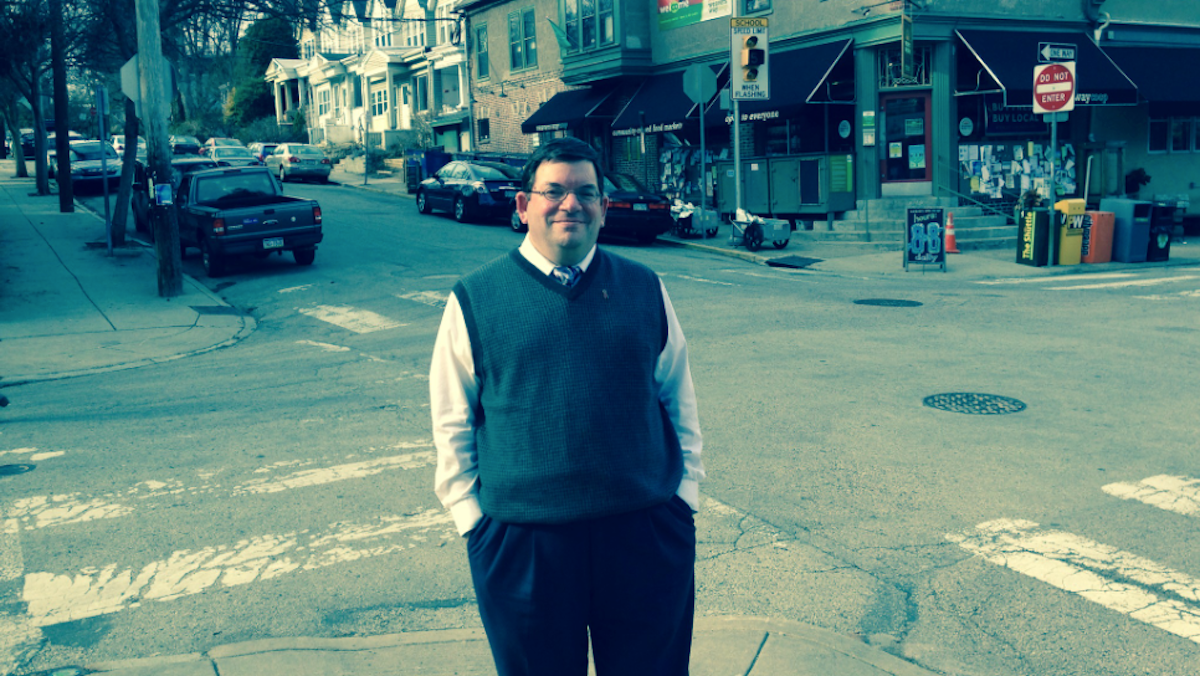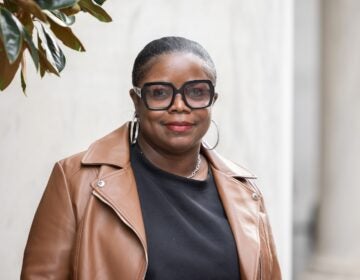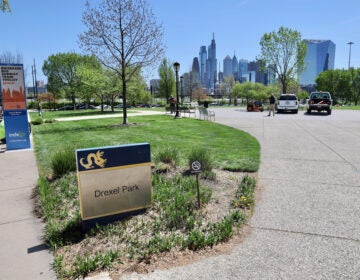High-school sexuality educator from Germantown to receive AIDS Fund ‘Founders’ Award’

Al Vernacchio, a Germantown resident and upper school sexuality educator at Friends' Central School, will be honored at Saturday night's AIDS Fund Black-Tie Gay BINGO event.(Brian Hickey/WHYY)
The professional and volunteer path which explains why The AIDS Fund will bestow its Founders’ Award on Al Vernacchio this Saturday has a lot to do with timing.
Vernacchio, a Germantown resident and Friends’ Central School‘s upper-school sexuality educator, will be honored with an award that “recognizes a person or a group of people who come together and fight HIV/AIDS in a unique way.”
“It’s very humbling,” Vernacchio told NewsWorks during a recent interview at Mt. Airy’s High Point Cafe. “I’m proud, because it’s a testament to the fact that the longer you’re in this work, the small things really add up.”
How he got here
Between 1986 and a 1993 layoff, Vernacchio taught at his alma mater, St. Joseph’s Preparatory School.
Since sex-ed was part of both his Prep responsibilities and graduate-school work at the University of Pennsylvania, he became ActionAIDS‘ volunteer coordinator and trainer from 1994 to 1998.
During that span, the job (and world) changed markedly, he said.
“I was helping volunteers work with people who were going to die, but with protease inhibitors [being shown to be effective in the treatment of HIV-1] in 1996, the whole thing had to change,” he recalled.
“All of a sudden, it became a back-to-work program for people who never thought they’d work again,” he continued. “It was new territory, a seismic shift. The case loads grew since, for people who would have died before, there was actually a lot more work to do.”
As public perception changed — a pivotal shift came with the 1996 Newsweek cover headline “The End of AIDS?” — funding for programs gradually decreased.
The perception of demographics of those affected changed, as well; it went from primarily gay white men to a vast spectrum of the population including African American women with children.
The challenge then became finding a “thought-provoking way to think about the epidemic as it evolved,” he said. Some were thinking “if we worked hard, we could stop it and we’d be done. But, it showed no signs of stopping.”
When he returned to education at Friends’ Central School in Wynnewood in 1998, he remained a volunteer.
Contributing to the impression that these career and educational transitions represent a “lovely circle” was the fact that students from the school perform service projects twice a year at both ActionAIDS and AIDS Fund.
High-school sex-ed, vers. 2014
Today, Vernacchio does more than teach 9th through 12th graders.
He also “organizes special programs and assemblies — such as the annual observance of World AIDS Day, working with AIDS Fund to bring their HIV/AIDS Timeline and AIDS Memorial Quilt to campus — and provides education for parents in healthy adolescent sexual development,” according to the AIDS Fund, which also cited the Nov. 2011 New York Times Magazine‘s “Teaching Good Sex” cover story among his bona fides.
In September, Harper-Collins will publish Vernacchio’s “For Goodness Sex: Changing the Way We Talk to Young People About Sexuality, Values, and Health” book.
“I teach sex education through the lens of social-justice education,” he explained. “The epidemic is so inherently tied to the social fabric, with regards to access to care and medications. None of the old issues went away.”
Vernacchio also pointed out that HIV “is still a death sentence” in some parts of the world and that the stigma has shifted from homophobia (before) to classism and racism (today).
However, he also noted that online culture has impacted how youths learn about, and are exposed to information, about both sex and relationships.
“Information used to be a garden hose; now it’s a fire hose. So much of what I do now is media literacy,” he said.
Technology has made it easier for sex educators to exchange ideas among themselves and, even though the traditional “birds and bees” talk isn’t all that different, for parents to find information necessary to talk about sex with their kids.
“This is the first generation of children who’ve always known about AIDS so, in some ways, it’s background noise,” he said. “There’s no attention paid to it because it doesn’t feel new. That’s the challenge. It’s gone from ‘This is here, and it applies to you’ to ‘This is still here, and it still applies to you.'”
Why they’re honoring him
Robb Reichard, executive director of AIDS Fund, explained why Vernacchio has chosen to receive this award, which honors the memory of the group’s founders.
“Al has continued to support HIV/AIDS in our community with great care and concern,” he said. “Each year, he brings students to volunteer in our office, and works with AIDS Fund to bring awareness to his entire school with our HIV/AIDS timeline and panels of the AIDS Memorial Quilt.
“We admire Al for integrating his devotion to HIV/AIDS awareness into his teaching to teenagers in a profound and thoughtful way, continuing to spread knowledge to young people in our community. We are so pleased to be honoring him at Black-Tie GayBINGO this year.”
The AIDS Fund’s Black-Tie Gay BINGO event starts at 6:30 p.m. Saturday at The Crystal Tea Room (Wanamaker Building, 9th Floor, 100 Penn Square East).
WHYY is your source for fact-based, in-depth journalism and information. As a nonprofit organization, we rely on financial support from readers like you. Please give today.




